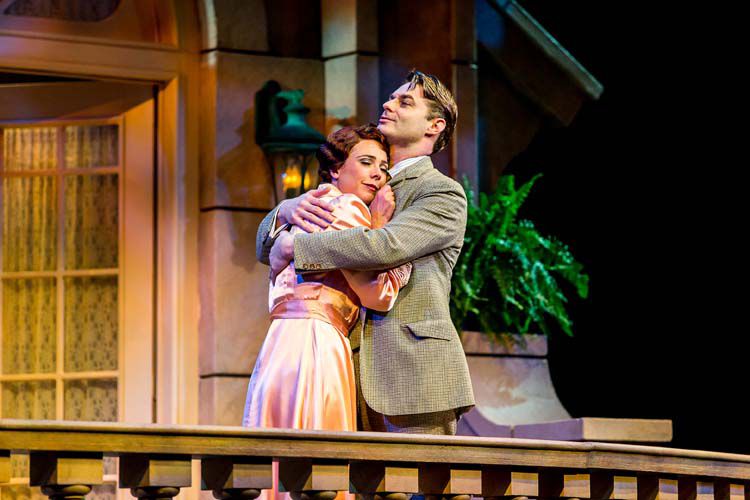
If you want to spend a perfectly good evening thinking about the worst relationship of your life, Riverside Theatre’s “Private Lives” is just the thing.
The comedy of manners, a genre meant to poke fun at upper-class affectations, turns on some unfunny, unmannerly behavior; the great Noel Coward laced his most famous play with enough laugh lines between dope slaps to keep a Riverside audience chuckling in spite of itself last week.
After a long string of musicals, it was a treat to have Riverside’s big-budget main stage dedicated to a straight play and an iconic one at that. The opening-night anticipation was further piqued as the curtain rose on Allen Cornell’s stunning set, a confection of a French Riviera hotel, its façade complete with entwined plaster dolphins set in an arched niche. And Gail Baldoni’s costumes continued the illusion on the good-looking cast of four (five, counting the welcome cameo of Andrea Gallo as the fussing French maid). For a play written just a year after the 1929 stock market crash, the clothes still reflected the glamor of the Roaring ’20s, charmeuse gleaming like ganache and suits fitted to a T.
Dark though the play quickly turns, Coward’s premise is pure farce: A divorced couple (Amanda, played by Catherine Gowl; and Elyot, played by Jason Loughlin) both remarry, then find themselves in adjacent rooms on their respective honeymoons.
The play, directed by Riverside regular James Brennan, opens with their new spouses Sibyl (Liana Hunt) and Victor (Spencer Plachy) each having a turn on the terrace, gunning to get their betrothed to dish on the ex. Their jealousies are as apparent as their shortcomings. The starry-eyed Sibyl and the clunky traditionalist Victor are both in for some major surprises; despite the shut-ups they get in reply to their leading questions, they may as well be blowing on hot coals.
As the two newlywed couples take turns emerging from their respective suites, their chit-chat only hints at the push-pull of past love: the inevitable ennui of Couple One for Couples Two and Three. Once the two in Couple One happen to step out without their better halves and hear the orchestra below playing their song, they each start singing it, discovering each other and the passion starts to burn white-hot again.
In minutes, they’ve slipped the marital noose, bolted for Paris together and are back at it in Amanda’s apartment. In a state of near stupor, they take a break and turn from sex to brandy. The teasing doesn’t stop, though, and when Elyot reads the signal wrong and starts kissing Amanda’s neck too purposefully, she breezily turns away: too full from dinner, she says. That too-familiar contretemps triggers rage on the part of Elyot. Locked on to a target who has veered off into the blue, he figures out another way to fire his missile: he goes ballistic.
Even an agreed-upon truce word can’t stop the resulting domestic violence. And that is what you have to call it, mutual though it is, and despite the funny flying feathers of the pillow fight, the startling smash of the lamps and the nicely executed somersaults over the couch.
I found it hard to stomach, particularly with few hints from the generally unsubtle acting of the black moods that drive such episodes – a few choice lines muttered or growled would have helped set that stage. Nor was there a sense of the intense sexual attraction that would have compelled the couple to hang on. Loughlin’s Elyot didn’t let his dandy down enough to make a 21st century audience feel the heat; and Gowl’s Amanda, though her lines were racy and her delivery coy, never seemed to lose herself to lust.
The New York Times’ Anita Gates was wowed at a production in Hartford, Conn., two years ago that Coward could pack a script with domestic violence and it doesn’t offend us 85 years later. That wasn’t the case at Riverside. I heard several in the audience remark that the smack-down humor was insensitive to an issue so many in the community work to prevent. I spent much of the evening wondering who in the audience was longing for a trigger warning.
“Certain women should be struck regularly – like gongs,” says Elyot to Amanda matter-of-factly in defense of his having slapped her across the face. Gates says we’re not offended because the abuse goes both ways: Amanda had just broken a record over his head. I guess Gates hasn’t considered the strength disparity that might make the next gong strike more consequential.
Beneath the farcical circumstance is a disturbing notion that defies comedic approach. Coward was all too familiar, a closeted gay man in 1930, of the indelible impulses that trail love yet are kept safely out of sight, like the stinging tentacles of a gossamer man-of-war. “Private Lives” wants us to laugh at that sting, presenting an abusive relationship as a banana-peel gag.
At a time when “no” means no and guns are pulled over the last slice of pizza, lines like “If you don’t stop screaming, I’ll murder you,” or “I should like to cut off your head with a meat axe,” may have lost their sense of hyperbole.
Coward then ties a bow around the piece – more like buckling the leather straps – by adding contagion to the toxin. With a device he used in more than one play, Coward lets the lover-combatants slip off to continue their banging – in both senses, while the action continues on stage: Their spouses, having discovered the cheating pair in their Paris lair, start up a good row of their own. Fwap! goes Sibyl’s hand across Victor’s face as Elyot winks at Amanda: Aw, so cute. There’s hope for those two, too! As Victor violently shakes Sibyl by the shoulders, Amanda and Elyot tiptoe off together, back to the front of love.



